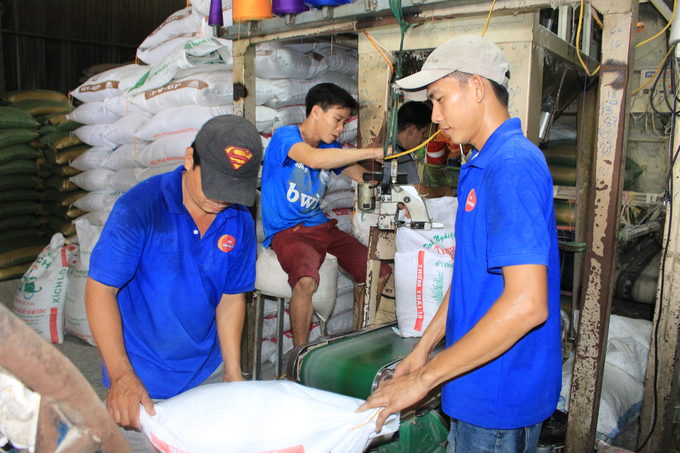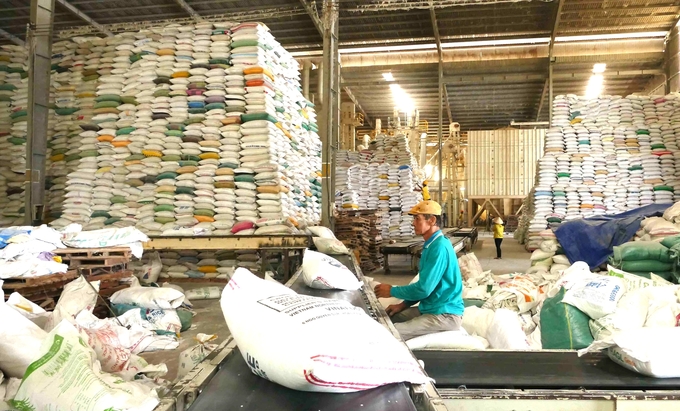May 18, 2025 | 03:08 GMT +7
May 18, 2025 | 03:08 GMT +7
Hotline: 0913.378.918
May 18, 2025 | 03:08 GMT +7
Hotline: 0913.378.918

Vietnam exported a total of 8.3 million tons of rice in 2023, with 90% of it being sent to the Asia-Africa market. Photo: Kim Anh.
The Asia- Africa regions are the largest markets with total number of 117 countries and territories, over 6.5 billion of people, accounting around 80% of the world’s population.
According to Mr. Nguyen Phuc Nam, Deputy Director of the Asia-Africa Market Department at the Ministry of Industry and Trade, the regions are considered important for Vietnamese rice exports. The largest markets are the Philippines, Indonesia, China, Ghana, and Côte d'Ivoire, among others.
Vietnam exported a total of 8.3 million tons of rice in 2023, with 90% of it being sent to the Asia-Africa market. This amounts to around 7.34 million tons, valued at over 4.1 billion USD.
In the Philippines market, Vietnam shipped 3.1 million metric tons of rice in 2023, valued at around 1.75 billion USD. Myanmar is followed by Thailand, Pakistan, and India.
In the previous year, the amount of rice exported to the Chinese market was 911,000 tons, with a value of 530.6 million USD, representing a 22.7% increase.

Mr. Nguyen Phuc Nam, Deputy Director of the Asia-Africa Market Department at the Ministry of Industry and Trade assessed that in the first quarter of 2024, Vietnam's rice exports to major markets continued to exhibit a favorable trend and achieved a growth rate. Photo: Kim Anh.
In the first quarter of 2024, Vietnam's rice exports to major markets continued to exhibit a favorable trend and achieved a growth rate. Specifically, the value of Philippines' jumped by 44%, amounting to 1.01 million tons. Indonesia had a significant rise of 300%, reaching 445,300 tons. Malaysia saw a 29% increase, reaching 99,000 tons. The West Asia-Africa region experienced a substantial growth of 87%.
Mr. Nam predicts that the price of exported rice will continue to rise in the future, which would be beneficial for Vietnam. Major rice producers and exporters are planning to reduce their output in light of the negative impacts caused by El Nino.
According to a report released by the US Department of Agriculture (USDA) on April 15, the projected worldwide output of rice for the 2023-2024 crop year is expected to exceed 515.5 million tons. The consumption demand is 521.3 million tons, whereas the deficiency of rice volume amounts to 5.8 million tons.
India will decrease its output to 134 million tons, which is 1.8 million tons less than the previous crop year. China will reduce its output by 1.3 million tons, resulting in a total of 144.6 million tons. Thailand and Indonesia will both decrease their outputs by 900 thousand tons, leaving them with 20 million tons and 33 million tons, respectively.
Particularly in India, the biggest global producer of rice, there has been a ban on the export of white rice since July 2023. The nation has just declared that it would prolong the ban until July 2024.
Given the current market condition, Mr. Nam is certain that there will be many prospects for the export of Vietnamese rice in the future. Therefore, businesses need to design strategies to harness the potential of these markets.

It is essential to have thorough evaluation and guidance on market demand and pricing information for businesses and localities to adapt their production management and formulate targeted strategies. Author: Kim Anh.
The Philippines market is projected to have sluggish growth and a decline in market share in 2024. Nevertheless, Vietnamese rice enterprises have built up trust and enduring partnerships with importers in this nation. Vietnamese firms must strive to preserve and enhance this edge.
Rice exports in the Chinese market are seeing intensifying competition. All rice products in this market show a pretty high level of quality, and exporting nations are placing more emphasis on packaging. Presently, Thai and Laotian rice packaging has been introduced into the retail network in China. Even in the northern area of China, renowned for its stringent quality criteria and packaging regulations.
Vietnamese fragrant rice and premium ST rice have gained popularity in the Chinese market. Vietnam has granted permission to around 200 Vietnamese firms to engage in the exportation of rice to this specific market.
In order to support rice export companies, Mr. Nguyen Phuoc Thien, Vice Chairman of Dong Thap Provincial People's Committee, proposed that the Ministry of Industry and Trade offer thorough evaluation and guidance on market demand and pricing information. This would enable businesses and localities to adapt their production management and formulate targeted strategies.
According to Mr. Le Thanh Tung, Deputy Director of the Department of Crop Production (Ministry of Agriculture and Rural Development), the current crop rotation in the Mekong Delta region effectively fulfills the demands of businesses, preventing scenarios of excessive rice supply without buyers or insufficient rice supply for businesses.
Ms. Huynh Thi Bich Huyen, the Director of Ngoc Quang Phat Import Export Joint Stock Company, suggested that the Vietnam Food Association provide assistance by establishing a minimum price limit, taking into account the commercial aspect. This would enable enterprises to meet the requirements for participating in bidding and prevent them from selling at rates lower than those of overseas.
Translated by Linh Linh

(VAN) In the face of counterfeit and imitation products, Khanh Hoa Salanganes Nest Company hopes for the prompt completion of the legal framework, strict enforcement against violations, and protection of the bird’s nest brand.

(VAN) Japan's efforts to lower the price of rice through the release of its stockpile may finally be making some progress, albeit at a snail's pace.

(VAN) U.S. tariffs are not only a 'shock', but also an opportunity for Vietnamese businesses to renew their mindset toward comprehensive development.

(VAN) As Bac Giang lychee enters the harvest season, Minister Do Duc Duy expects that the fruit will contribute greatly to agricultural exports due to standardized production and deep processing.

(VAN) Consumers have shown a preference for free-range eggs, but those farming systems are more vulnerable to biosecurity risks like bird flu.
/2025/05/09/5701-1-184335_301.jpg)
(VAN) Vietnam’s eel exports nearly doubled thanks to a mud-free farming model, opening up new prospects while still facing numerous barriers related to international standards.

(VAN) Minister Do Duc Duy warned that if production is not professionalized and supply chains are not transparent, the U.S. market could become a growth bottleneck.